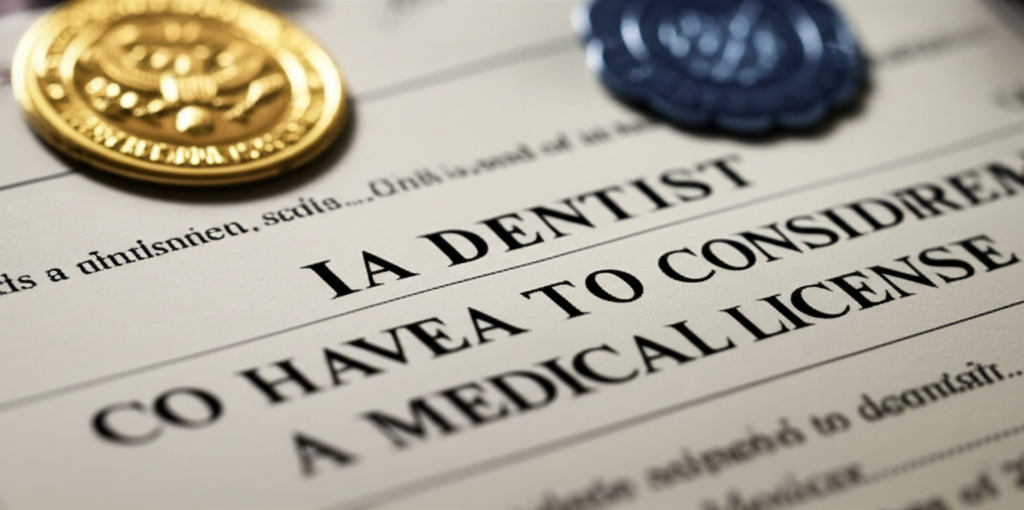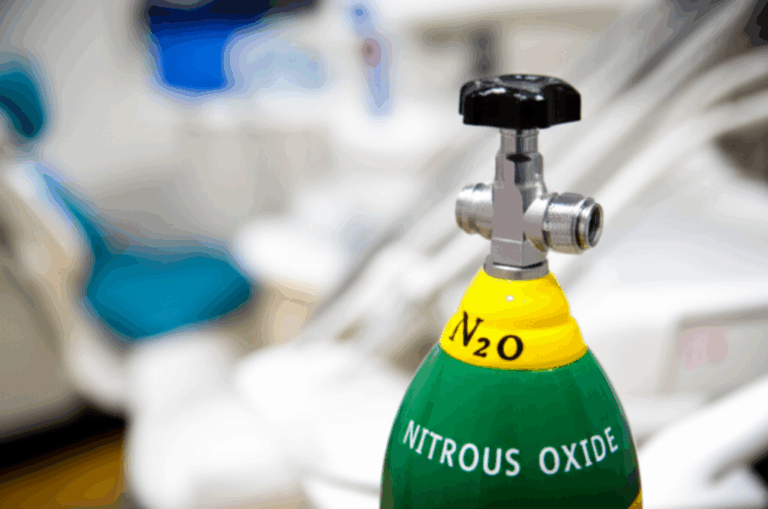
Are Dentists Medical Doctors? Understanding Dental vs. Medical Licensing
Have you ever wondered, “Is my dentist considered a doctor like my family doctor?” If so, you’re not alone! In this article, you’ll find out what kind of license dentists have, how dental and medical degrees are different, and why knowing these things matters for your health and choices.
You might be surprised by all the ways dentists and doctors work together to keep you healthy—from your teeth to your whole body!
Table of Contents
1. Introduction: Why It Matters If Dentists Have Medical Licenses
Let’s start with a question you might have: Is my dentist a real doctor? Maybe you see your dentist wearing a white coat, or they’re called “Dr.”, and you wonder if they went to medical school just like a regular doctor. This is really important, not just because you’re curious! If you need a big surgery, emergency help, or even another opinion, knowing your care provider’s training and license helps you make smart choices.
We all want safe, skilled people to take care of our smiles. Let’s see what kind of “doctor” your dentist really is!
2. What Is a Medical License?
Let’s explain what a medical license is. In the U.S., only someone with a Doctor of Medicine (MD) or Doctor of Osteopathic Medicine (DO) degree who passes the medical board exams and is allowed by a state medical board can get a medical license.
A medical license lets someone:
- Figure out and treat sicknesses for the whole body
- Write prescriptions for most health problems
- Do surgeries and other medical things at hospitals or clinics
Here’s the main thing: Dentists do not get a general medical license. They have their own way to become dental professionals.
3. How Do Dentists Get Licensed?
Dentists get a dental license instead of a medical license. Here’s how they do it:
- Step 1: Finish college (usually in subjects like biology or chemistry)
- Step 2: Go to dental school for four years to earn a Doctor of Dental Surgery (DDS) or Doctor of Dental Medicine (DMD) degree
- Step 3: Pass two big tests: The National Board Dental Examination (NBDE or INBDE) and a state or regional hands-on test
- Step 4: Get OK’d by a State Dental Board
After this, dentists can legally:
- Check teeth, gums, and jaws
- Figure out mouth problems
- Pull teeth, fill cavities, fix gum disease
- Write medicine for dental problems
- Do surgeries in the mouth and jaw
A dentist’s license lets them be a health worker with a very specific focus—the mouth and things nearby. While regular doctors treat the whole body, dentists are super-trained in everything about teeth and gums.
4. Do Dentists Go to Medical School?
A lot of people ask, “Did my dentist go to medical school?” The answer is, no. Dentists go to dental school.
Let’s look at the difference:
| School | Main Focus | How Long | Degree Name |
|---|---|---|---|
| Medical School | Whole body, all health | 4 yrs + 3-7 yrs training | MD or DO |
| Dental School | Mouth, teeth, jaw, face bones | 4 yrs | DDS or DMD |
Dental school has classes in things like anatomy, biochemistry, and oral surgery—mainly about the head, mouth, and face. People who finish get doctor degrees but not the same kind as a medical doctor.
5. Dentists and The “Doctor” Title: Is It Real?
So, why do we call dentists “Doctor”? It’s because they earn a doctor degree—either a DDS or DMD. It’s not just a friendly title! The American Dental Association (ADA) says these degrees are equal in training and schooling, just with different names.
Here’s the difference with the titles:
- Doctor: Used for anyone with a doctor-level degree. This means dentists, doctors, vets, and sometimes even some teachers use the “Doctor” title.
- Medical Doctor: Means someone with an MD/DO and a medical license.
You should feel sure calling your dentist Doctor. They earned it!
6. What Can Dentists Legally Do?
Let’s get clear. A dental license lets dentists do lots of things, but there are also things they can’t do.
Dentists can:
- Figure out and treat mouth and jaw problems
- Give numbing shots (local anesthesia)
- Write certain medicines (like antibiotics, calming medicines)
- Pull teeth or do surgeries in the mouth
- Make and fit crowns, bridges, dentures, or veneers, often working with a dental ceramics lab
- Notice signs of sickness that show in your mouth and send you to a doctor if you need
Dentists cannot:
- Treat sicknesses outside the mouth and jaws (like heart problems or diabetes)
- Do surgeries not in the mouth (like taking out an appendix)
- Write medicines not related to dental health
You can also see some special dental work at a crown and bridge lab, or learn how a china dental lab helps dentists around the world.
7. How Are Medical and Dental Boards Different?
Dentists and doctors follow different main rules.
- Dentists: Licensed by State Dental Boards. These groups make the rules for dental schools, education, ethics, and jobs for dentists.
- Doctors: Licensed by State Medical Boards. They set rules for medicine, like at hospitals and clinics.
Both have to pass big tests. Both can lose their license for doing wrong. Each group can only treat the parts of the body they’re allowed. Dentists stay with mouths, doctors work on the rest.
8. What Is an Oral and Maxillofacial Surgeon?
Sometimes you’ll meet a special dentist called an Oral and Maxillofacial Surgeon (OMFS). These dentists train at hospitals to do tricky surgeries—like fixing broken jaws, taking out tumors, or rebuilding face bones.
Some Oral Surgeons do even more. They can earn both a DDS/DMD and an MD. When this happens, they might get both a dental and a medical license. This is rare, but it shows that dentistry and medicine connect in some ways.
If you need special surgery with implants, you could visit an implant dental lab that works with these trained surgeons.
9. Why Does This Matter for Patients?
Let’s make it simple. Say you have a really sore tooth. You go to the dentist. They can:
- Figure out what’s wrong
- Pull the bad tooth
- Write medicine to stop infection
- Send you to a doctor if the infection spreads outside your mouth
But if you have a problem with your heart or lungs, a dentist can’t treat stuff outside your mouth.
Why does this matter? Because when you see the right professional for your problem, you get safer, better, and faster help. Dentists, doctors—even chiropractors or eye doctors—all have their own jobs, training, and limits.
10. The Systemic Connection: How Oral Health Impacts General Health
Here’s something many people don’t know: your mouth is the door to your whole body. What happens in your mouth can affect your heart, diabetes, or even pregnancy. Problems like gum disease are linked to heart disease and other whole-body sicknesses.
Dentists are trained to spot:
- Mouth sores that might mean you have bigger health problems, like diabetes or not enough vitamins
- Signs of mouth cancer
- Links between gum disease and other health problems
When a dentist sees something strange, they call your doctor to help keep you healthy all over. This teamwork is called integrated healthcare.
11. Conclusion and Key Takeaways
We’ve learned a lot! Knowing if your dentist has a medical license helps clear up confusion and makes healthcare choices easier. Here’s the big thing: Dentists don’t have medical licenses, but they are trained and licensed health workers in dental care.
They study hard, pass big tests, and have to keep learning. Dentists and medical doctors both help you stay healthy, just in different ways.
Bullet Point Summary: Most Important Things to Remember
- Dentists don’t have a medical license—they have a dental license.
- Dentists earn DDS or DMD degrees, which are doctor degrees for dental care.
- Only MD or DO doctors can have a medical license and treat the whole body.
- Dentists can find and fix problems with teeth, gums, jaws, and close areas.
- Dental boards and medical boards are separate, with their own rules and tests.
- Oral and Maxillofacial Surgeons might have both dental and medical licenses—this is rare and takes lots of extra school.
- Dentists are doctors of mouth health and are important for your whole health.
- Your dentist can spot signs of bigger health issues and will send you to your doctor if needed.
- Dental labs, like a digital dental lab, help dentists give you great care.
- Seeing the right licensed expert keeps you safe, healthy, and smiling!
References:
If you have questions about dental training, licenses, or your dental health, visit your dentist—they’re always happy to share their knowledge, and so am I!








